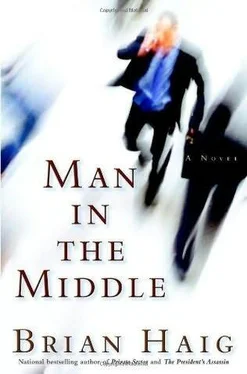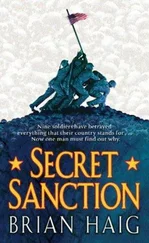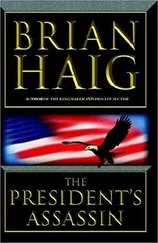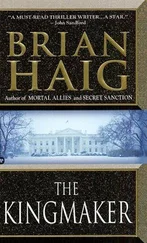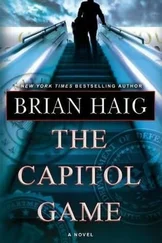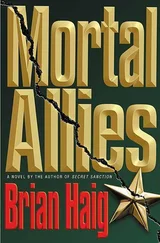Brian Haig - Man in the middle
Здесь есть возможность читать онлайн «Brian Haig - Man in the middle» весь текст электронной книги совершенно бесплатно (целиком полную версию без сокращений). В некоторых случаях можно слушать аудио, скачать через торрент в формате fb2 и присутствует краткое содержание. Жанр: Триллер, на английском языке. Описание произведения, (предисловие) а так же отзывы посетителей доступны на портале библиотеки ЛибКат.
- Название:Man in the middle
- Автор:
- Жанр:
- Год:неизвестен
- ISBN:нет данных
- Рейтинг книги:4 / 5. Голосов: 1
-
Избранное:Добавить в избранное
- Отзывы:
-
Ваша оценка:
- 80
- 1
- 2
- 3
- 4
- 5
Man in the middle: краткое содержание, описание и аннотация
Предлагаем к чтению аннотацию, описание, краткое содержание или предисловие (зависит от того, что написал сам автор книги «Man in the middle»). Если вы не нашли необходимую информацию о книге — напишите в комментариях, мы постараемся отыскать её.
Man in the middle — читать онлайн бесплатно полную книгу (весь текст) целиком
Ниже представлен текст книги, разбитый по страницам. Система сохранения места последней прочитанной страницы, позволяет с удобством читать онлайн бесплатно книгу «Man in the middle», без необходимости каждый раз заново искать на чём Вы остановились. Поставьте закладку, и сможете в любой момент перейти на страницу, на которой закончили чтение.
Интервал:
Закладка:
"It just seemed strange that you phrased it that way."
"Yes," he noted, "of course it was only coincidental."
Apparently, his English wasn't that good; he meant rehearsed.
I glanced at Phyllis, who was toying with her pen, as though this discussion had nothing to do with her-what it actually meant was that she didn't need to hear it a second time. I was tempted to walk around the table and inspect her elbow to see how hard it had been twisted. I love conversations where everybody's reading from a script.
I looked at Bian. She raised an eyebrow and stared back. Belatedly, we both were coming to the realization that the powers back in Washington had concluded that bin Pacha was a hot potato best passed to our Saudi friends.
I didn't really have time to analyze this. Parts of it, however, weren't all that complicated: bin Pacha was a potential embarrassment to somebody; Bian and I weren't grown up enough to comprehend or manage the subtleties; and definitely, Turki al-Fayef wasn't here as an advisor.
Anyway, Waterbury, showing his usual finesse, was pushing things along, and he declared, "All right, that's settled." He stood, apparently assuming this meeting was over, and said to his sheik friend, "As soon as you bring in a plane, we'll transfer your prisoner. Questions?"
Phyllis raised no objections, so to help her out, I mentioned, "You can't give what you don't have."
"What are you talking about?" asked Waterbury.
"What are we all talking about, Waterbury? Ali bin Pacha. I'm not releasing him."
"You know what, Drummond?" Waterbury replied. "You're an even dumber son of a bitch than I thought. You work for the United States government."
"And why am I having to remind a former MP of the legal definitions of apprehending officer and current custody? As an officer of the court, until I sign a statement of transfer, Ali bin Pacha is my prisoner."
Bian was just opening her mouth, but only one idiot needed to jump off this cliff. I nudged her shin under the table.
"You'll do as you're ordered, Drummond."
"By whom?"
"By me."
"Let me repeat my favorite phrase. I don't work for you, Waterbury." I looked him in the eye and noted, "Tell me who's ordering you and maybe I'll change my mind." My fingers were crossed, of course.
He chose to ignore my query, as I suspected he might. He turned to Phyllis. "Order him to turn over the prisoner."
I had this weird feeling that I was in the movie Groundhog Day, and we were right back where we started, with Waterbury ordering Phyllis to order me to hand over Daniels's computer. This time, though, I did not trust Phyllis to respond appropriately. So before she could comply, I instructed him and her, "I no longer work for Ms. Carney either."
Even Phyllis's jaw dropped an inch over that one, which was a treat.
I withdrew the typed orders from my pocket and held them aloft for everybody to observe. "My boss is the Chief of the JAG Corps. Why don't you call and ask him to order me to turn over my prisoner?"
Waterbury stared at the orders for a moment. "This is preposterous. Jesus H. Christ… we all know those orders are phony."
"I don't know that."
"You're pissing me off, Drummond."
Exactly. And so on; around and around we went for a while.
The sheik's head swiveled back and forth, from Waterbury to me, and he stroked his beard and tried to look like he was following this brouhaha between a high official and a lowly functionary. It has been my experience, however, with officials from-how do I express this politely? — from less than democratic nations, that they are laughably clueless about issues that can't be handled through a barked threat or a visit in the night. At least he no longer looked bored or disinterested.
Anyway, it was time to call Waterbury's bluff; unfortunately he was in the middle of a long-winded homily about my duties as a commissioned officer, the constitutional subservience of the uniformed military to civilian authority, and any second, we'd be into the Father, Son, and Holy Ghost.
So the first time he paused to catch his breath, I broke in and said, "Here's another legal reality. Rendition requires a signed authorization by the Department of Justice."
"That's ridiculous."
With lawyer logic, I replied, "Yes, and it's the law."
Waterbury gave me a puzzled stare.
This man was entirely clueless regarding the legal aspects of rendition, which opened the tantalizing question of exactly whose idea this was. Three possibilities. Option A, for an unknown reason, was that somebody in Washington wanted bin Pacha buried forever in a Saudi vault. Option B, somebody in D.C. liked the idea of the Saudis beating the crap out of this guy to make him squeal, which, despite being fairly commonplace these days, also violates the United Nations Convention Against Torture, of which the United States happens to be a treaty signatory. Or Option C, the Saudis wanted Ali bin Pacha and offered us a choice: Hand him over or America will never need another highway bill.
I thought it over for a moment. A, or B, or C each looked plausible. But so did A and B and C.
Bottom line: Had the White House ordered this, as I suspected it had, I should start worrying about my next assignment, maybe my next career-and maybe my life. But frankly, I was past caring, which is always a danger point for whoever's pissing me off. Also I wasn't completely out on a limb. The golden rule of Washington was on my side: The party with the most to hide always holds the weakest hand.
I knew this. And Mark Waterbury, too, knew this.
So he drew a few breaths and decided the moment was pregnant for a new approach. He dropped his Lear-like act and gave me a friendly smile. "Sean… Hey, I'm not out on my own out here. You don't… Look, there's strong support for this… in Washington."
"Where in Washington?"
"At high levels. Leave it at that."
He wished. "Fine. Show me the letter of approval signed by the Attorney General."
"I don't…" He looked confused for a moment. "I'm quite confident the Attorney General can be persuaded to issue such an order."
"Well, you never know. Why don't we call him and ask?"
Everyone fell quiet for a moment. Then the sheik looked at me and asked, "What would it require to satisfy you, Colonel?"
I was sure he had heard what I said, and I could only assume that his question was in the nature of a bribe. I was tempted to test his sincerity; I mean, this was the land of genies, and until you rub the bottle a few times you never know. Then again, people who are willing to bribe you are often willing to do other things, too. Like hurt you. Sometimes worse.
So instead, I informed him, "Let me tell you my problem. You people don't share."
He stared back with an icy smile and advised, "You should not believe all the libelous things you read about my country in your newspapers."
"How long have you worked in Saudi intelligence?"
"Over twenty years. This is my career work. Why do you ask?"
I looked him in the eye and said, "In 1996, I worked on the Khobar Towers investigation."
I could see in his eyes that this reference struck home. After Arab terrorists bombed the American military barracks in the Khobar Towers in Saudi Arabia-after nineteen American servicemen were killed and hundreds more wounded-the Saudis quickly rounded up the suspects, and without allowing U.S. investigators a single interview, they were all swiftly beheaded.
As I mentioned, I had a role in that investigation and we smelled Al Qaeda; all we ended up with was two bad smells. I've often wondered how differently the present might look had we interrogated those suspects, had we perhaps gained insights into Al Qaeda and their future plans and plots. That would've been good for America and good for the Saudis.
Читать дальшеИнтервал:
Закладка:
Похожие книги на «Man in the middle»
Представляем Вашему вниманию похожие книги на «Man in the middle» списком для выбора. Мы отобрали схожую по названию и смыслу литературу в надежде предоставить читателям больше вариантов отыскать новые, интересные, ещё непрочитанные произведения.
Обсуждение, отзывы о книге «Man in the middle» и просто собственные мнения читателей. Оставьте ваши комментарии, напишите, что Вы думаете о произведении, его смысле или главных героях. Укажите что конкретно понравилось, а что нет, и почему Вы так считаете.
